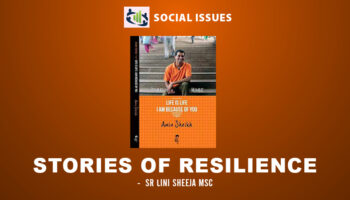When you see destitute boys carrying luggage at a railway station, do you ever think that one of them may become a successful lawyer?
That is the story of a boy I know well.
Sanjay Das (name changed) graduated from Shyamabazar Law College in Kolkata with distinction in 2019. After passing the Bar Council of India examination, he registered himself as a Lawyer in Kolkata High Court in 2020 and began practising under the guidance of a senior advocate. For Sanjay it was a long journey from the Dumdum Railway platform, where he spent five long years after running away from home while studying in Class II, to the hallowed portals of the High Court. On this journey he was accompanied by Don Bosco Ashalayam, a project with street and railway station children in Kolkata, during his school days; and Terra Indica, an organization to promote talents among Youth at Risk headed by a French philanthropist in Kolkata, for his college studies.
Age seven: From Home to Railway Station
The story of Sanjay makes a very fascinating reading indeed. At the very tender age of seven, he landed up in Dumdum railway station by a local train that passed daily through his remote village in 24 Pargana District, West Bengal. Extreme poverty bordering on starvation and the possibility of a bleak future forced Sanjay to take the extreme step of leaving home without permission or information to his parents.
What awaited him in the city railway station baffled him. With vast crowds of people and hundreds of trains arriving and leaving, he was literally at a loss as to what to do and where to begin. Being an intelligent boy, he observed what was happening around and began to imitate boys like him making a living on the railway platform. He offered his services to sell tea at a teashop on the platform and it was accepted. Slowly, he settled down in the station like other children of his age. He found a place in one corner of the station to sleep at night and slowly learned all the tricks of the trade for survival on the platform. He could earn sufficient money for his food and clothing by selling tea, polishing shoes, and a myriad of other jobs that we see children doing on railway platforms and in trains. Other children noticed that he possessed a sharp intelligence and had leadership qualities. Gradually, he became a sort of a leader of these children.
What Next?
Five years passed. Sanjay he realized that he was not a small child any more. He also become aware that a railway platform was not a place for one to make a permanent residence. He came to know from some boys living with him on the platform about the monthly overnight stay programme that was being conducted on the first Sunday of every month at Don Bosco Ashalayam, Howrah, by the Childline. (Ashalayam was founded to rehabilitate street and railway station children by weaning them away from such places and placing them on the path to education, skill training, job placement and permanent settlement with marriage, land and house. Ashalayam now is in its 35th year of existence and have educated, trained and permanently settled hundreds of boys and girls over the years.)
Sanjay ventured out with other boys for one such monthly programme in Ashalayam and returned back to the railway platform on the following day. He attended the programme for a few subsequent months and then decided to settle down in the night shelter wing of Ashalayam. He found the activities there very interesting. These were meant to help the children to give up life on the platform and return to school. He told me of his decision to continue with his studies. Seeing that he was smart and exceptionally intelligent, we got him admitted in Class V at St. Peter’s School, Maulali. In the final exam that year he stood first! He was given a double promotion to Class VII. From then on, there was no looking back. Sanjay excelled in every field of activity, both curricular and non-curricular. Everyone who knew him was impressed by his talents and winning personality and capacity for leadership.
After completing Class XII with flying colours, Sanjay moved out of Ashalayam and joined Terra Indica for his college studies. In 2014, while doing his first year B. Com.,he qualified himself for a government-sponsored exchange programme in one of the colleges in the United States of America for one year. On his return from the United States, he decided to pursue the study of Law. Terra Indica stood by him solidly till he began his practice in the High Court in 2020.
The Hardest Part of Life
I met Sanjay recently in Kolkata during my monthly visit to the city to oversee the works in two slums that I am looking after. We were meeting after a long time. He was on his way back home from the High Court. During our friendly chat, I asked him a few questions. He was very happy to answer and was very candid in his sharing.
The first thing I asked Sanjay was: “What was the hardest time in your life, and your most difficult experience?”
He replied: “From my childhood onwards, I have gone through many tough times. It is difficult to choose the hardest one from among them. However, I can say that life at the railway station where I lived all alone as a child for a few years was the hardest among them all. I was really small, probably seven or eight years old. We were extremely poor. The repeated verbal and physical abuse by my family members made me take the painful decision to run away from home. Coming to the railway station and staying there was terrible and frightening. The first few days I experienced the pangs of hunger. Then there was the danger of sexual molestation by strangers, the fear of being beaten up the night by the railway police. The threat of illness due to unhygienic living conditions, extreme weather and lack of decent clothes, caused real danger to my life. Looking back today, I can say that life ahead cannot be worse than this and I can face any challenge that may come on the way.”
What Helped Him
Then I asked him what helped him most to become what he is today. This is what he had to say: “There are so many things that have helped me to become what I am today. Reaching Ashalayam at the right time and getting the opportunity to study was the most important thing that happened to me. It provided me with a lot of exposure and opportunities. Apart from that, the most important factor were a few good people who believed in me, accepted me the way I was and loved and cared for me in spite of the background from which I came. They remained very dear to me and helped me out in my most difficult times. Some people contributed by giving me a part time job and an opportunity to do further studies to achieve my dream. Others listened to my thoughts and supported me emotionally without being judgemental, which made me feel good as a person. Some people helped me financially in my time of need. Without them I do not know where I would have been today.”
His Suggestions
I asked him one more question before he took leave. I asked him what he would like to suggest to educators (Sisters, Brothers, Fathers and others) who are working for the uplift of the needy. With gratitude welling up in his heart towards all those who stood by him in his growing years, he told me: “I can never forget the people who stood by me and encouraged me to pursue my dream in my school and college days. I would like to suggest to all the educators to feel the needs of the children and fill them with love and empathy, and teach them a love for values—value of a good life, value of education, value of friendship (most important). Never show anger to children, even if they do the most terrible things. Children always get inspired from their elders, so it is important for educators to select the right staff to look after them, people who love and care for them and not just work for a remuneration. Apart from that, I would like to request all the educators to give children as many chances as possible, no matter how troublesome they may prove to be. No one can predict accurately at what moment in life the miracle of transformation can take place.”
* * *
Another Poor Boy Who Came Up—and Gave Hope to Millions
I have narrated the story of Sanjay just to highlight the importance of creating access to education and retention in school and what transformation it can bring about in the lives of children. A small help given at the right time can produce incredible results. I am reminded of the herculean struggle that Don Bosco had to undergo in his childhood to gain access to education and retention in school. Growing up at home without going to school due to poverty, he had to leave home at the age of thirteen, looking for work and was accepted in a family as a farmhand. He worked there for two years, displaying sincere dedication and hard work. His exceptional intelligence and his capacity for studies did not go unnoticed and before long, through the kind generosity of some benefactors, he was able to start regular schooling. But to support himself during his school years, he did incredible things. He slept in a “cubby-hole under a staircase;” stayed with a tailor and wore an old, ill-fitting jacket; worked as a helper in a blacksmith’s shop and other shops. Once he even went begging, knocking at every door seeking help for his studies; stayed in a family performing sundry chores in return for food and lodging; worked in a cabinetmaker’s shop; later worked as a waiter in a café; looked after a horse; worked in a vineyard, and became a night watchman for some time. These experiences of school life, however, would help him in a big way later on in life when he began his work among the poor boys.
Education is the key
Creating access to education, especially for those at the lowest rung of the society, is one of the crucial concerns of every nation today. To provide educational opportunities for all is part of social justice, to bring about social equality, especially for those who are afflicted with all forms of dehumanising poverty. It is precisely with this in view that Article 45 of the Constitution of India has enjoined upon the State to provide universal primary education to all children between six and fourteen years of age. While access has been created to some extent, retention in school and quality education remain a far cry.
The last fifty years of our history show that the commitment to universal literacy has been low among the priorities of the national planners at all times. So far the efforts to increase the spread of education have concentrated almost exclusively on either increasing the number of schools or on setting up endless schemes to provide incentives to deprived sections of the population to enable them to attend school. Little attention is given to the quality of education that needs to be imparted. Quality education includes physical infrastructure, competence and motivation of the teaching staff, and the organisational and managerial factors that determine the effectiveness with which resources are utilised.
In the present-day society with its advancement in science and technology, education has become a powerful means of effecting change, transformation and development in every sphere of human life. Nations and societies that have gone in for universal education and total literacy have attained a better standard of living, higher national income, better health and longevity for their citizens compared to those countries where literacy levels are low. It is a fact that no literate country in the world is poor, and no illiterate country is rich. Though the status of development can be measured from several socio-economic and demographic indicators, education occupies a primary place in examining the development of a country.
I want to conclude with what Daniel Webster wrote: “If we work on marble, it will perish. If we work on brass, time will efface it. If we rear temples, they will crumble down to dust. But if we work on immortal souls, if we imbue them with principles, with the just fear of the Creator and love of fellowmen, we engrave on these tablets something which will brighten all eternity.”
Fr Mathew George SDB
To subscribe to the magazine, click Subscribe





